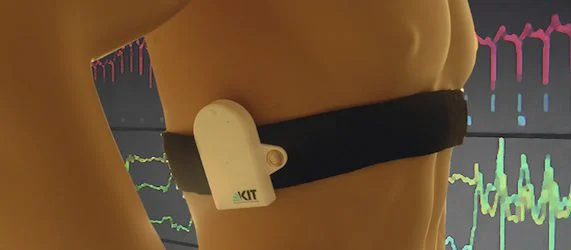Patients suffering from cardiac diseases may rapidly become emergencies, in which case seconds can make the difference between life and death despite many cardiac conditions announcing themselves months before.
Symptoms however, are simply overlooked and a long-term ECG could help identify issues. An innovative sensor belt developed at Germany’s Karlsruhe Institute of Technology, enables long term documentation of a patient’s cardiac activity around the clock for a period of up to six months.
Wilhelm Stork of Karlsruhe Institute of Technology explains that the sensor belt also detects very rare cardiac events, aiding the decision making with regards to finding an appropriate therapy. By measuring a selection of parameters like cardiac and breathing frequency, activity, and conductivity continuously over a very long term and recording an electrocardiogram (ECG) a physician obtains all the data he needs to assist a patient at such an early stage so as to avoid the development of an emergency.
Karlsruhe Institute of Technology, the Karlsruhe Municipal Hospital, and the University Hospital of Tübingen tested long-term usability of the sensor belt in a trial that included approximately 50 test persons who had previously suffered from an acute cardiac insufficiency. The patients wore the belt for some days up to some weeks, and for about two weeks on average and in the post-treatment phase, the sensor belt was applied for continuous monitoring. One test person was even monitored for a continuous period of six months, setting a record for the longest ever non-invasive ECG.
The sensor belt, which the patient can easily apply by himsel, contains four novel dry electrodes. As a result, irritation of the skin is prevented and the wearing comfort is maintained for months while very reliable measurement data are collected. Malte Kirst, one of the developers at KIT, described the belt as resembling joggers’ known pulse monitors, however it is capable of recording far superior amounts of data. With the size and weight of a small mobile phone, the device can acquire more than 1 gigabyte of data over a period of a week, when the memory card is read out and the accumulator is recharged.
Kirst, who generated parts of the analysis software at the Research Center for Information Technology (FZI) before he came to KIT, went on to explain that a usable ECG is recorded for about 99% of the time even when single electrodes fail as a result of body movement as a result of the special design and data evaluation.
In conventional mobile ECG measurement devices the use of conductive pastes is required, with medical staff needing to attach the self-adhesive electrodes precisely to the skin. Skin irritations frequently occur after some days, or the paste dries out and generally data are recorded for 24 hours, sometimes for seven days. Measurement device implants are also available for high-risk patients, however the innovative new sensor belt combines the advantages of both systems and has no drawbacks, making it accessible to more patients.
With almost 10 million Europeans affected by chronic cardiac insufficiency and over 40% of the patients dying within five years upon diagnosis, it is one of the most frequent cardiovascular diseases causing billions of healthcare costs due to the intensive treatment of emergencies and subsequent long stays at hospitals. Subsequently, early diagnosis and initial treatment of starting cardiac failure (decompensation) is highly beneficial for both patients and the healthcare system. Continuous monitoring with such a sensor belt, can predicte decompensation.
The sensor may also be applied for the diagnosis of atrial fibrillation and so-called syncopes, i.e. spontaneous losses of consciousness and a team of four is presently working on turning the sensor belt prototype into a medical product for this application. Under the Exist programme of the Federal Ministry of Economics, the development work is funded with EUR 500,000.
Source: AlphaGalileo
4 December 2013
Latest Articles
Research, Cardiovascular, ECG
Patients suffering from cardiac diseases may rapidly become emergencies, in which case seconds can make the difference between life and death despite many...










